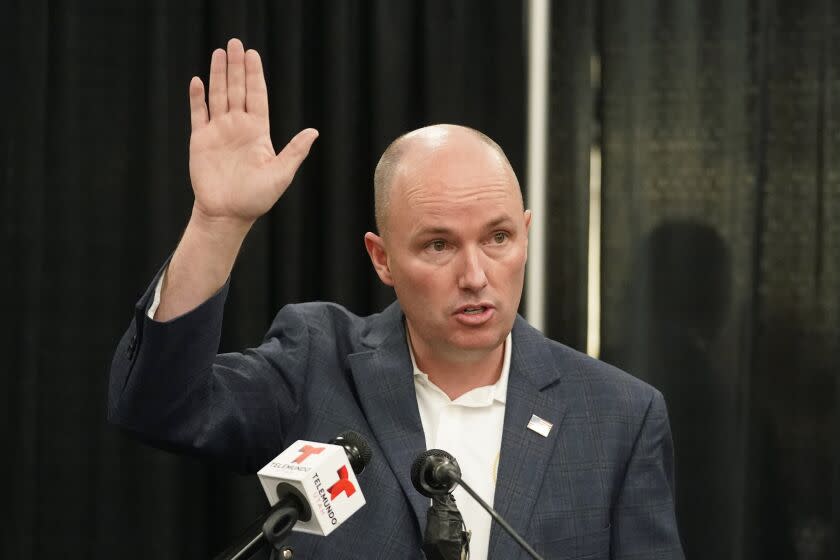
Back on March 22, Utah Gov. Spencer J. Cox took a stand against anti-transgender legislation that was rare — indeed, unique — among Republican politicians by vetoing a harsh anti-transgender bill passed by the Legislature.
“I always try to err on the side of kindness, mercy and compassion,” Cox wrote in his veto message on the law designated HB 11. He noted that the measure, which prohibited transgender girls from participating in school sports that match their gender identities, was directed at four transgender students out of the 75,000 student athletes in Utah.
“Rarely has so much fear and anger been directed at so few,” he stated.
Legislation that impacts our most vulnerable youth requires careful consideration and deliberation.
Utah Gov. Spencer J. Cox, while signing the most restrictive anti-transgender law in the country
On Saturday, Cox climbed down from his principled position by signing a vastly harsher law.
The 2023 Utah Legislature’s SB 16 doesn’t target transgender youths participating in school sports. It’s much, much broader — a comprehensive ban on providing any gender-affirming medical care to most transgender minors, including hormone therapy.
SB 16 is a “brutally unfair” law that bans “the only safe and effective treatment for many children with gender dysphoria,” says Shannon Minter, legal director for the National Center for Lesbian Rights, which is already preparing a lawsuit challenging the law in partnership with the Utah ACLU.
How does one judge the character of politicians? One way is to see if they stand up for principle in the face of intense political pressure.
By that measure, Cox is a spectacular failure. We can go further: He’s rewritten the dictionary definition of “political hypocrisy.”
Cox explained his March 2022 veto of HB 11 in a five-page, closely reasoned letter to the legislative leaders, who responded by overriding his veto.
His signing statement for the new law runs a crisp 128 words and calls the measure a “nuanced and thoughtful approach.”
Before examining whether that’s a fair description of one of the harshest pieces of anti-transgender legislation in the country, let’s look at the political context — that is, the snarling, mercilessly malevolent approach of Republican politicians to transgender people.
Since the Trump years and up to the present day, Republicans have been trying to roll back anti-discrimination protections for LGBTQ people. But they’ve especially targeted the transgender community.
The reason isn’t hard to discern. In their crass and cruel quest for targets to unite their base against, they had run out of acceptable candidates for discrimination and abuse.
Open racism was no longer socially acceptable (though it has made a strong comeback lately, in Trump’s wake). It is no longer respectable to make fun of the mentally ill, the homeless, the disabled.
LGBTQ people have moved into the mainstream of culture and society. Even conservative and Republican families have found themselves accepting LGBTQ siblings, children and parents.


Gay and lesbian characters in Hollywood movies and TV shows have evolved from those whose homosexuality set them apart to those who are just like everyone else, except gay and lesbian; and to those whose homosexuality is irrelevant to the story or their role in it.
Importantly, LGBTQ people had acquired a political voice; gay-bashing would no longer work for a candidate as it had in the past, except perhaps in the most benighted corners of American politics.
In the Republican world, transgender people are among the last who can safely be depicted as “the other.” Gender identity is still a perplexing topic for Americans. That makes it easy to caricature, and easy to paint transgender people and the assistance their families are trying to provide them, as somehow strange and nefarious.
Bills governing gender identity have proliferated in red-state legislatures; at least 18 states are currently considering such measures, among 184 anti-LGBTQ bills on state dockets already this year.
Last year, the Idaho House passed a law criminalizing gender-affirming therapies for children under 18, ranging from hormone and puberty-delaying treatments to surgery, and even made it a crime to arrange for such treatment out of state.
In Texas, Gov. Greg Abbott instructed state health officials to open investigations into families providing gender-affirming care for their transgender children on the grounds that the care could be defined as “child abuse.” Abbott’s order has been suspended by state judges pending the resolution of a lawsuit filed by the ACLU and other organizations.
Then there’s Florida, which is under the thumb of GOP Gov. Ron DeSantis, the nation’s most thuggish culture warrior. DeSantis’ enormously discriminatory Parental Rights in Education law, known familiarly as the “Don’t Say Gay” law, seems on its surface to concern sex education generally (it bans instruction on sexual orientation through third grade and limits it for fourth through 12th grades).
But DeSantis has made clear that the transgender community is its true target. “How many parents want their kids to have transgenderism or something injected into classroom instruction?” DeSantis said in a March 2022 news conference, while the measure was still being debated in the Legislature. “I think clearly right now, we see a focus on transgenderism, telling kids they may be able to pick genders and all of that.”
Transgender advocate Erin Reed observes that red states are the epicenter of anti-transgender legislating. Alabama and Arkansas have enacted bans on hormone therapy and puberty blockers, Arizona and Tennessee have banned surgery, but that’s a red herring, since gender-affirming surgery is not the medical standard of care for transgender minors.
That brings us back to Utah and its Republican governor, Spencer Cox. For a moment in political time, Cox stood against the tide of malignant bigotry that defined the GOP’s approach to LGBTQ rights. At the time, I praised him and Indiana Gov. Eric Holcomb (who also vetoed an anti-transgender law) for their principled stances, which I took as evidence that the Republican Party had not completely thrown in with its worst instincts.
Alas. Now it turns out that Cox has allowed that tide to wash over him.
The new law prohibits providing gender-affirming care to any transgender youth not previously diagnosed with gender dysphoria. It allows transgender youths to “disaffirm” their consent to the treatments retroactively, up to the age of 25 years old.
The law, says Reed, “will effectively end gender-affirming care for transgender youth in the state of Utah.” The law went into effect immediately with Cox’s signature, “before any veto campaign could be mounted and before families could make preparations,” Reed noted.
In his 2022 veto message, Cox wrote sympathetically of the challenges faced by the four transgender schoolchildren playing team sports in Utah — “four kids who are just trying to find some friends and feel like they are a part of something. Four kids trying to get through each day.”
He paid attention to research finding that 86% of trans youth reported suicidal thoughts and 56% hadattempted suicide. “I want them to live,” he said. “And all the research shows that even a little acceptance and connection can reduce suicidality significantly.”
In his veto letter to the legislative leaders, Cox even footnoted the study from the University of Toronto and Ohio State where those statistics are found. A 2022 study from the University of Washington and UC San Diego found that gender-affirming care such as puberty blockers and gender-affirming hormones led to “60% lower odds of moderate or severe depression and 73% lower odds of suicidality over a 12-month follow-up.”
That research seemed to vanish into the mists when Cox turned to the new law, SB 16. This time, he claimed that “more and more experts, states and countries around the world are pausing these permanent and life-altering treatments for new patients until more and better research can help determine the long-term consequences.”
This is a gross distortion of the landscape. Experts have found, as Kareen M. Matouk and Melina Wald of Columbia University wrote last year, that “gender-affirming care — a medical and psychosocial health care designed to affirm individuals’ gender identities — greatly improves the mental health and overall well-being of gender diverse, transgender, and nonbinary children and adolescents.”
As for the actions of states and countries, Cox was merely paying obeisance to the same ignorant, culture-warrior behavior of his fellow Republicans.
In last year’s message, Cox complained that the legislation he was vetoing had been introduced “late on the last day of the session and debated and passed just a few hours before midnight.” It replaced a version that had been intensively debated and would have created a commission of experts to rule on a case-by-case basis which transgender students would be permitted to participate in sports.
This year’s law was introduced and passed within a two-week period, receiving little debate. Cox signed it despite paying lip service to the notion that “legislation that impacts our most vulnerable youth requires careful consideration and deliberation.”
I asked Cox’s office to reconcile his approached to the two bills; they simply referred me to his signing statement, which of course underscores the mismatch in his two actions rather than explaining his reversal.
What will be the fate of Utah’s ban? Certainly it will come under legal challenge, but the courts’ reaction is a crapshoot. All previous state bans have been overturned by judges, but in this era of anti-transgender panic it’s uncertain how this one will fare.
All one can say is that the anti-transgender winds are blowing strongly through Republican ranks, and they blew Spencer Cox’s claim to “compassion” to smithereens.
This story originally appeared in Los Angeles Times.








